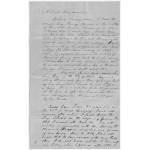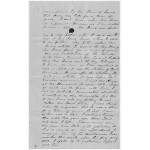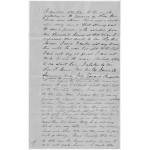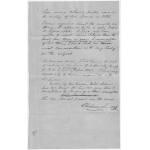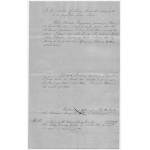Witnesses for Claimant in the Matter of Henry Garnet, Fugitive Slave
10/18/1850
Add to Favorites:
Add all page(s) of this document to activity:
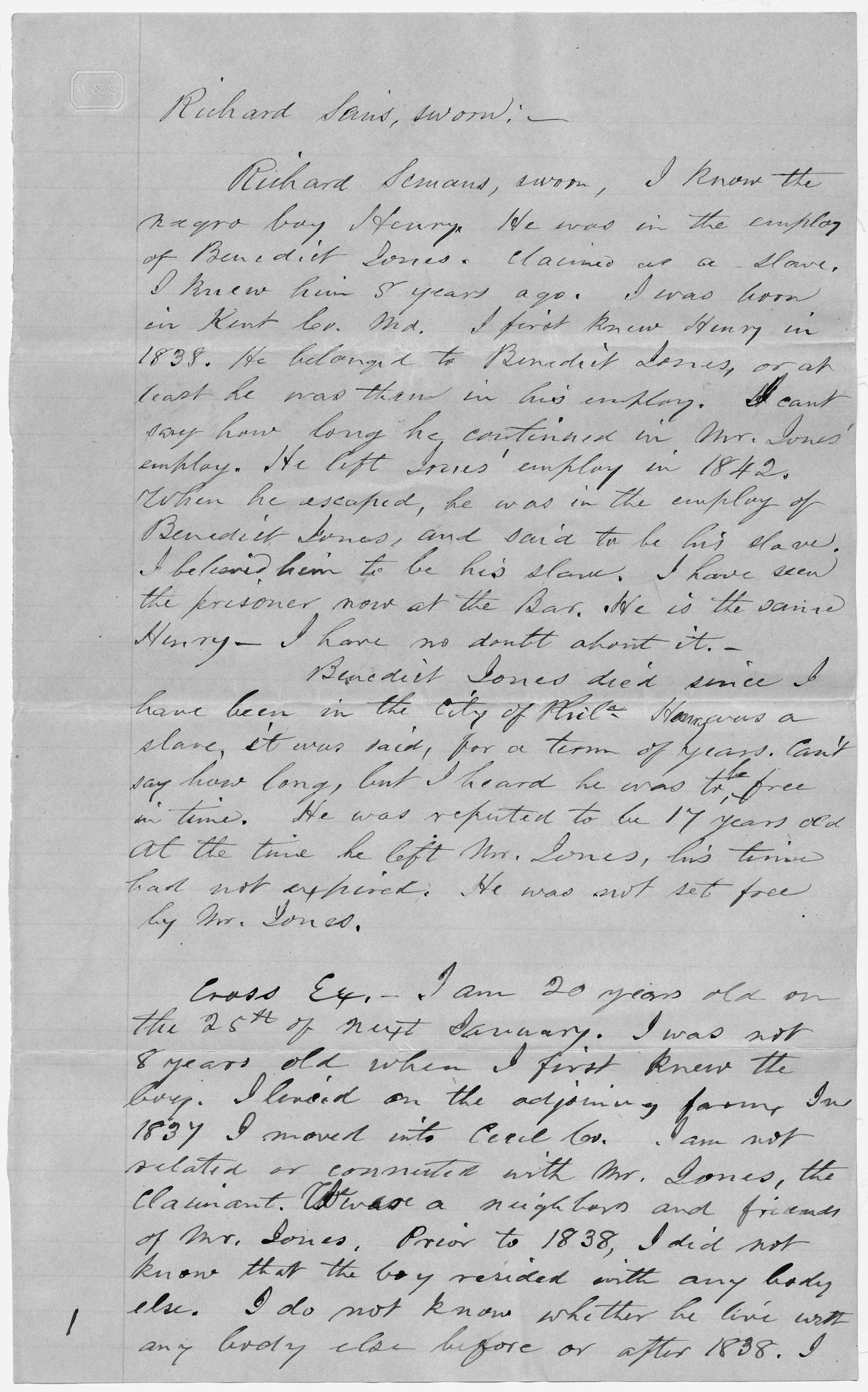
Add only page 1 to activity:
Add only page 2 to activity:
Add only page 3 to activity:
Add only page 4 to activity:
Add only page 5 to activity:
This document comes from a fugitive slave court case in which Henry Garnet (Garnett) was charged with being a "fugitive from labor." His was called the the first fugitive slave case in Philadelphia. Witness Richard Semans gives detailed testimony regarding his knowledge of the owership of Henry Garnett. John E. Ferguson and Edward Semans give brief statements regarding their place of residence. Ultimately the judge in the case ordered Garnett to be discharged.
Escape to freedom was one of the methods of individual and sometimes group resistance to enslavement. As the abolition movement gained strength and the political climate deteriorated, more "fugitives from labor" took the Underground Railroad to freedom. Not all were so successful; many were captured.
Transcript
Richard Semans, sworn:Richard Semans, sworn, I know the negro boy Henry. He was in the employ of Benedict Jones. Claims as a slave. I knew him 8 years ago. I was born in Kent C[o?] Md. I first knew Henry in 1838. He belonged to Benedict Jones, or at least he was then in his employ. I cant say how long he continued in Mr. Jones’ employ. He left Jones’ employ in 1842. When he escaped, he was in the employ of Benedict Jones, and said to be his slave. I believed him to be his slave. I have seen the prisoner now at the Bar. He is the same Henry—I have no doubt about it.—
Benedict Jones died since I have been in the City of Phila. Henry was a slave, it was said, for a term of years. Can’t say how long, but I heard he was to be free in time. He was reputed to be 17 years old at the time he left Mr. Jones, his time had not expired. He was not set free by Mr. Jones.
Cross Ex. -- I am 20 years old on the 25 th of next January. I was not 8 years old when I first knew the boy. I lived on the adjoining farm. In 1837 I moved to Cecil Co. I am not related or connected with Mr. Jones, the claimant. [We?] [were?] a neighbors and friends of Mr. Jones. Prior to 1838, I did not know the boy resided with any body else. I do not know whether he live with any body else before or after 1838. I
was informed by Mr. Benedict Jones that Henry was held for a term of years. I don’t know when Mr. Jones so informed, as near as I can recollect it was in 1840. Mr. Jones was speaking to my father, when he said so. It was at Mr. Jones house when he spoke to my father. My father asked Mr. Jones whether he owned the boy Henry, Mr. Jones [paid?] for a term of years. He has no recollection of the duration of the term. Cannot tell how it happened that Mr. Jones said the boy belonged to him. As near as I can recollect it was in 1840, -- it was the election of Genl. Harrison. It was after the election. I can’t say whether it was before Genl. Harrison was [inaug]. I last saw Henry at Mr. Benedict Jones’ in 1842. I was at work on the farm with him. I had no particular conversation about him. I recollect no other conversation but that of Mr. Jones with my father. He was called Mr. Jones’ slave. I was always under the impression that he was a slave for a term of years. The last I saw of him was in 1842. I continued living there until two years ago. Mr. Jones died since I left. I have never seen this man since 1842 until yesterday. He has a mark on his right cheek. I recognise him by his countenance. I remember this mark upon his face since 1842. I spoke of it yesterday before I saw him.
I directed attention to the mark yesterday in the presence of Thos.Price Jones and others. There was a doubt upon my mind that Henry was the same person who escaped from Mr. Benedict Jones, at that time. I expressed that doubt to Mr. Thos.Price Jones. I said I could not say it was him until he was brought to the light. I did not say at first I did not think it was the man. Nobody spoke to me about him. I spoke to Mr. Thos. P. Jones, Mr. [illegible] W. Jones, Ed Semans, and [illegible] Edward Ferguson & about the mark on his face. It was before the claim on the man was made. It was 8 o’clock night before last at the Red Lion Hotel. I called there to see my friends the Jones’—No papers were exhibited to me. There was no conversation about the marks. I remarked to them there was a scar on his right cheek, [illegible] just there. (pointing to the spot). I have no knowledge how he got the scar. I know of no other mark, -- more than his face. Well, he is not very black nor very light. I would say medium. Jones and others told me they were in pursuit of Henry. Jones himself told me. He told me he knew where he was. I did not ask him. I can’t tell
how many colored people were in the employ of Mr. Jones in 1838.
I never inquired about the mark on Henry. It appeared to be a [cut ?]. I noticed it before 1842. I have not been written to about him— I have been to Cecil Co. twice a year. I never spoke of him then nor heard him spoke of, as I recollect. I have had no [illegible] direct conversation with any body on the subject.
Mr. Tenor – ex. direct.—I had been in the habit of working in Mr. Jones’ field for with Henry for 2 or 3 years occasionally before 1842. I had every opportunity to become acquainted with his person.
Question by Mr. Brown. –What children had Mr. Jones? He had two sons, Thos. P. Jones, & [illegible] Jones, -and three daughters John [illegible]
The Mr. Jones’s present are the sons.
Richard Semans
[different handwriting]
In the matter of Henry Garnett, alleged to be a fugitive from labor.
John Edward Ferguson, sworn.—I live in Cecil Co. Md. about 6 miles from Mr. Thos. P. Jones’ residence. I have lived there nearly 22 years. I knew Benedict Jones. He died in June 1849, I think. I cant say that I knew this boy Henry, in Cecil County. Of course, I know nothing about him.
[large space]
Edward Semans, sworn.—I live here. I have lived in Cecil Co. about 5 years ago. In January 1846, I left there. I moved there in the winter of 1837.
Evidence insufficient.—By the Court.-The Prisoner Henry Garnett, is discharged.
[illegible] claiming the Prisoner, Henry Garnett,the Party having failed to make the proof Act of Congress recognized by [illegible] the Prisoner is discharged.
This primary source comes from the Records of District Courts of the United States.
National Archives Identifier: 279018
Full Citation: Witnesses for Claimant in the Matter of Henry Garnet, Fugitive Slave; 10/18/1850; Fugitive Slave Case, #4 Garnett; Fugitive Slave Case Files, 1850 - 1860; Records of District Courts of the United States, Record Group 21; National Archives at Philadelphia, Philadelphia, PA. [Online Version, https://www.docsteach.org/documents/document/witnesses-for-claimant-in-the-matter-of-henry-garnet-fugitive-slave, April 26, 2024]Rights: Public Domain, Free of Known Copyright Restrictions. Learn more on our privacy and legal page.



